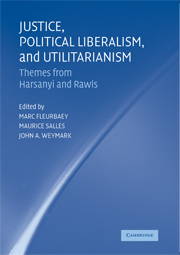Book contents
- Frontmatter
- Contents
- Preface
- List of Contributors
- 1 An Introduction to Justice, Political Liberalism, and Utilitarianism
- PART ONE THEMES FROM RAWLS
- PART TWO HARSANYI'S IMPARTIAL OBSERVER AND SOCIAL AGGREGATION THEOREMS
- 5 Harsanyi's Impartial Observer Is Not a Utilitarian
- 6 Social Aggregation and the Expected Utility Hypothesis
- 7 A Welfarist Version of Harsanyi's Aggregation Theorem
- 8 Preference Aggregation after Harsanyi
- PART THREE GOODNESS AND WELL-BEING
- PART FOUR SHARING THE GAINS FROM SOCIAL COOPERATION
- PART FIVE RIGHTS AND LIBERTIES
- Index
6 - Social Aggregation and the Expected Utility Hypothesis
Published online by Cambridge University Press: 09 February 2010
- Frontmatter
- Contents
- Preface
- List of Contributors
- 1 An Introduction to Justice, Political Liberalism, and Utilitarianism
- PART ONE THEMES FROM RAWLS
- PART TWO HARSANYI'S IMPARTIAL OBSERVER AND SOCIAL AGGREGATION THEOREMS
- 5 Harsanyi's Impartial Observer Is Not a Utilitarian
- 6 Social Aggregation and the Expected Utility Hypothesis
- 7 A Welfarist Version of Harsanyi's Aggregation Theorem
- 8 Preference Aggregation after Harsanyi
- PART THREE GOODNESS AND WELL-BEING
- PART FOUR SHARING THE GAINS FROM SOCIAL COOPERATION
- PART FIVE RIGHTS AND LIBERTIES
- Index
Summary
Introduction
Harsanyi (1955, 1977) interprets his Social Aggregation Theorem as providing support for weighted utilitarianism – the social ranking of alternatives by a weighted sum of utilities. In the fixed population setting considered by Harsanyi, classical and average utilitarianism coincide and correspond to having identical weights for each individual. The problem Harsanyi considers is one of social choice under uncertainty. Following von Neumann and Morgenstern (1947), he supposes that the set of social alternatives consists of all the lotteries that have a fixed finite set of certain alternatives as possible outcomes once the uncertainty is resolved. Harsanyi requires each individual and society to have preferences that satisfy the expected utility axioms and he represents these preferences by von Neumann–Morgenstern utility functions. His theorem demonstates that the social utility function must be an affine combination of the individual utility functions if society is indifferent between a pair of alternatives whenever all individuals are indifferent (the familiar Pareto Indifference condition). Thus, for any choice of the von Neumann–Morgenstern utility representations, alternatives are ranked socially according to a weighted sum of utilities. The Strong Pareto principle implies that all of the individual weights can be chosen to be positive.
Sen (1976) has questioned Harsanyi's utilitarian interpretation of his theorem, noting that the weights used in Harsanyi's theorem to aggregate the individual utilities depend on which von Neumann–Morgenstern utility functions are chosen to represent the preferences, whereas with weighted utilitarianism, the weights should be independent of this choice. Further, the expected utility theorem only says that a preference ordering that satisfies the expected utility axioms can be represented by a von Neumann–Morgenstern utility function.
- Type
- Chapter
- Information
- Justice, Political Liberalism, and UtilitarianismThemes from Harsanyi and Rawls, pp. 136 - 183Publisher: Cambridge University PressPrint publication year: 2008
- 4
- Cited by



